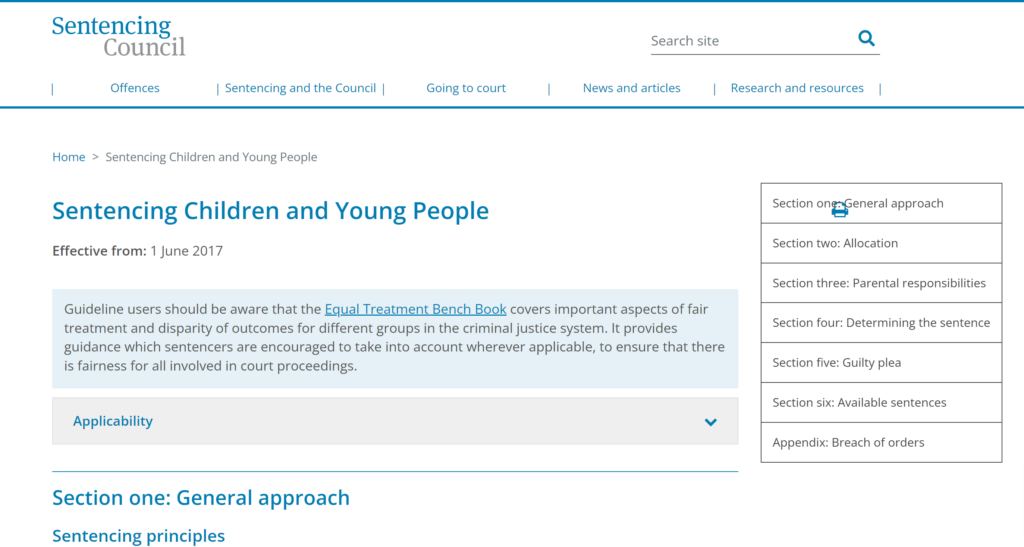
Image credit: Crown Copyright
In a recent case (Spivey [2022] EWCA Crim 997) a Judge was faced with offenders who had just turned 18 years of age. When sentencing, he made the following observation:
“I do have in mind the guidelines in relation to sentencing children and young people.”
However, he concluded that as one of the appellants was over 18 and the other two were approaching their 18th birthdays:
“… it cannot be prayed in aid that greatly, in my judgment, looking at the facts of this case by way of a discount of the sentence.”
Was that approach correct in law?
In light of R v RB, JS and HG [2020] EWCA Crim 643, the proper approach is to deal first with matters relating to the offence (in Spivey’s case there are none), then personal mitigation, reduction for youth, and finally the pleas of guilty.
The Judge took the adult sentence and, in the light of one appellant already being over 18 and the other two within months of becoming so, he concluded that there was little mitigation in age. In fact, he appears to have given no reduction for it at all. He appears to have regarded the reaching of the age of 18 as the crossing of a Rubicon.
However, recent authorities have repeatedly underlined the fact that the passing of an 18th birthday should not automatically bring into effect the full rigour of an adult sentence; that rather attention should be paid both to age and maturity.
As to those aged 17, section 6 of the overarching guideline Sentencing Children and Young People provides for the situation where an increase in the age of a child or young person results in the maximum sentence on the date of the finding of guilt being greater than that available on the date on which the offence was committed. In such situations, 6.2 states that the court should take as its starting point the sentence likely to have been imposed on the date at which the offence was committed. This includes young people who attain the age of 18 between the commission and the finding of guilt of the offence. But when this occurs, the purpose of sentencing adult offenders has to be taken into account, including such features as: the punishment of offenders; reduction of crime (including by deterrence); the reform and rehabilitation of offenders; the protection of the public; and the making of reparation by offenders to persons affected by their offences.
Section 6.3, states: “When any significant age threshold is passed it will rarely be appropriate that a more severe sentence than the maximum that the court could have imposed at the time that the offence was committed should be imposed. However, a sentence at or close to that maximum may be appropriate.”
Section 6, at 6.46 states: “When considering the relevant adult guideline, the court may feel it appropriate to apply a sentence broadly within the region of half to two thirds of the adult sentence for those aged 15 – 17 and allow a greater reduction for those aged under 15. This is only a rough guide and must not be applied mechanistically. In most cases when considering the appropriate reduction from the adult sentence the emotional and developmental age and maturity of the child or young person is of at least equal importance as their chronological age.”
Therefore, the Judge fell into error in failing to recognise this passage.
Does it make a difference?
In Spivey’s case, the original sentence was 14 months youth detention, reduced to 12 months on appeal.
This reduction in the sentence may not seem like a considerable discount, but it is, in fact, almost 15%.
The numbers can be considerable if the same principle is applied to more serious cases.
This case illustrates that Judges must pay careful attention to the complex sentencing framework surrounding young offenders and that lawyers must be alert to any errors made.
Our entire team are expertly trained in all aspects of sentencing law and will not hesitate to advise on appeal in appropriate cases.
How can we help?
We ensure we keep up to date with any changes in legislation and case law so that we are always best placed to advise you properly. If you would like to discuss any aspect of your case, please contact any member of our vastly experienced Criminal Defence team, for assistance with any criminal law related matter.
–
Mr John Stokes (John.Stokes@danielwoodman.co.uk),
Mr Anthony Pearce (Anthony.Pearce@danielwoodman.co.uk) or
Mr Daniel Woodman (Daniel.Woodman@danielwoodman.co.uk).









